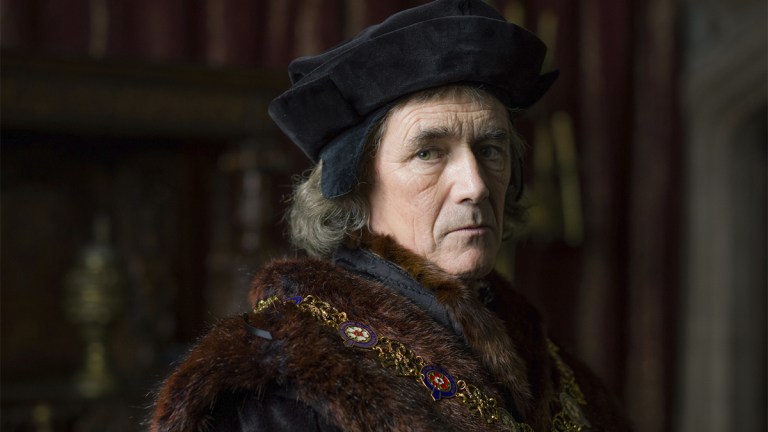Wolf Hall: controversy, adaptation and poetic licence
After its 2016 Golden Globe win, we revisit the controversies surrounding BBC Two's sumptuous Wolf Hall adaptation...

2015’s roster of prestige dramas was particularly dense, but the BBC’s take on Hilary Mantel’s Wolf Hall might just have already claimed its crown as the most controversial. It arrived freighted with the baggage always attached to adaptations of acclaimed novels, and further burdened by some thorny controversies all of its own. Mantel’s spirited attack on philosopher-saint Thomas More and equally fervent defence of his nemesis and her hero, Thomas Cromwell, was always bound to ignite debate. That, of course, is before we even touch on the subject of that rogue c-word and the choice to film night-time scenes by candlelight. We want accuracy, but only on our terms; when it jars with our perceptions of the past, out it goes.
Despite its name, Wolf Hall is in fact an adaptation not only of that book, but also of Bring Up The Bodies, the second instalment of Mantel’s planned trilogy. It covers the seemingly inexorable rise of Thomas Cromwell, from lawyer to Cardinal Wolsey (superbly brought to life by Jonathan Pryce) through his elevation to the position of chief minister to the king, Henry VIII. Cromwell guided Henry through his divorce from his first consort, Catherine of Aragon, and oversaw the profound social and religious breach that was the English Reformation of the 1530s. He helped raise Anne Boleyn, and then to bring her and the faction around her to their doom.
After her supplanter Jane Seymour’s sudden death following the birth of her son Edward, Cromwell sought to engineer a continental match for his master. The German princess Anne of Cleves was not to the king’s liking, however, and the six-month marriage brought Cromwell himself to Tower Hill in 1540. Henry would later publically lament Cromwell’s fall, but only far too late. Mantel follows historian Geoffrey Elton’s view of Henry’s closest counsellor as a maligned, forward-thinking statesman too often blamed for his master’s rash cruelty. Wolf Hall and its sequel attempt to take us into the mind of a historical figure whose life and its complexities are, like those of all his contemporaries, lost behind a veil of partisan mythologising.
Writer Peter Straughan and director Peter Kosminsky have succeeded in giving us the Cromwell of Mantel’s imagination. How close that figure is to the man behind the legend is open to question. Given that Mantel is not an historian, it seems unfair to hold her to that discipline’s view of what constitutes academic rigour. David Starkey and Simon Schama were quick to weigh in, noting that the Cromwell portrayed by Mark Rylance is not supported by the evidence.
The question remains: does it matter? Given that this is fiction, maybe not. Mantel’s account of Cromwell’s ascent and his violent world keeps events in their proper order, and often refers directly to the dialogue transcribed in court records and noted down with grim precision by those eager to lend the accused sufficient rope with which to hang themselves. Anne Boleyn’s hysterical reference to her ‘little neck’ as she awaits the executioner, Henry’s spat with the Imperial ambassador, the indefatigable Chapuys, the displaced queen Catherine’s final moving words in a letter to the man she still considered her husband: all are part of the historical record.
Where Mantel and her adaptors have strayed from the established path, of course, is in seeking to recreate Cromwell’s inner life, one which ended with the stroke of an axe in 1540. Wolf Hall’s triumph is in evoking that world lost behind the oil paintings and the French hoods. It strips away the layers of myth surrounding Henry VIII’s court, and steadies the shifting images of the king himself from Charles Laughton to Keith Michell.
We step into Cromwell’s shoes when reading Mantel’s books through her occasionally confusing, but ultimately effective, method of using the third person while keeping the narrative relentlessly focused on Cromwell’s point of view. Kosminsky evokes this by keeping the camera as close to Rylance as possible, capturing his changing expression as Cromwell thinks of his past, his family, or his faith. We see him smile as his master the king remarks with patronising fondness on his own good sense in employing the son of an honest blacksmith. Flashbacks to childhood beatings have already told us that Cromwell senior was anything but. The camera follows Rylance’s gaze as he contemplates the face of a woman in a Flemish tapestry; Mantel gives us his thoughts on the lost love he is reminded of, while Straughan has him relate the story to his friends on another occasion.
In the BBC’s behind-the-scenes interview with Rylance and Kosminsky, the director related his fears of costume dramas after a bruising experience with Wuthering Heights. Since then, he’s become renowned for work on contemporary political material, from New Labour to the death of Dr. David Kelly – The Government Inspector, his 2005 account of Kelly’s death, was his first collaboration with Rylance, who played the ill-fated scientist. Despite his concerns, Kosminsky was the ideal choice to document sixteenth-century political wrangling. His previous examinations of more recent events are still, in a sense, period dramas, evoking distinct cultural climates that belong firmly to a specific time and place, yet troublingly remind us that, when it comes to scandal and hubris, we are never quite out of the woods.
That, ultimately, is Wolf Hall’s achievement. The world it ushers us into is instantly familiar, with its Parliament and its monarchy, its English countryside and its bawdy humour. We are reassured, yet almost instantly disturbed by a sudden reminder of its alien qualities. Cromwell’s happy family life is destroyed in a day by the sweating sickness, a highly contagious disease that periodically ravaged England during the sixteenth century, and that claims his wife and daughters in one fell swoop. The paranoia of Henry’s gilded court surrounds us at every turn, with the unspoken memories of the bloody fifteenth-century civil wars that tore his realm apart only forty years earlier always a hovering menace. Henry’s education has made him a Renaissance prince like his contemporaries François I of France and Emperor Charles V, but he has inherited a kingdom riven by dynastic squabbles and fratricidal bloodshed. His father had known only too well that only one pretender, one Perkin Warbeck or Lambert Simnel, was needed to bring the tensions of the past back to boiling point. His son would erase his Plantagenet competitors from the political scene one by one, by exile or execution. Damian Lewis’s Henry is a chillingly convincing depiction of the king, with his boyish charm, towering rages and infinite capacity for self-delusion.
Mantel acknowledges Thomas More’s humanist principles and intellectual prowess even as she condemns his torture of his religious opponents. Anton Lesser, however, adds welcome nuance to a figure who is neither a straightforward monster of fanaticism, nor the spotless saint of legend. His More is a highly intelligent, sensitive man who truly believes he is sparing the souls of heretics by burning them alive; better a brief torment on earth than perpetual suffering in Hell. It is this that leads him to defy the king, that genuine terror of divine judgement that contrasts so vividly with Anne Boleyn’s statement to Cromwell that people should say anything that will keep them alive. In the event, neither she nor Cromwell would survive Henry VIII’s paranoia.
Bernard Hill’s magnificently crude Duke of Norfolk provides Mantel and Straughan with many of their best lines. One which does not make it into Wolf Hall, however, is that long-lived peer’s famous remark to Thomas More. It is the key to Norfolk’s great longevity. He clung on to royal favour even after two of his nieces – Anne Boleyn and Henry’s fourth queen, Catherine Howard – had been put to death for treason. Cromwell and many of his peers would learn the truth of it all too late. ‘Indignatio principis mors est – the anger of the prince means death.’ Wolf Hall launches us into that dreadful, fascinating world we thought lost, and reminds us that we still live in its shadow.
